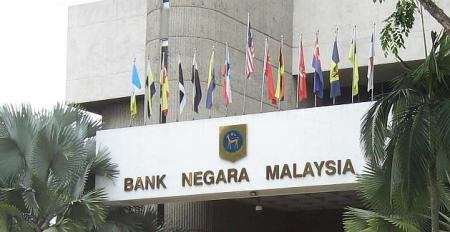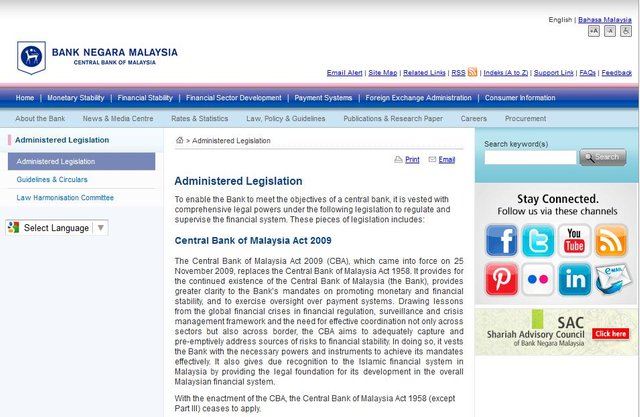The nefarious Malaysian law – The Central Bank Act of Malaysia 2009
This article was originally posted at People's Trust Malaysia on May 21, 2015

Be known that the central bank in Malaysia is “Legalized” and its powers are embedded and entrenched in the Laws of Malaysia Act 701 and called the The Central Bank Act of Malaysia 2009, which repealed the original 1958 Act.

Here are snippets of the Act which I find suspiciously nefarious in nature and very disconcerting:
The Act
An Act to provide for the continued existence of the Central Bank of Malaysia and for the administration, objects, functions and powers of the Bank, for consequential or incidental matters.
Part II
Section 3
(4) The Bank shall have its Head Office in Kuala Lumpur and
may open branches and appoint agents and correspondents in or
outside Malaysia
Section 4
Central bank for Malaysia
The Bank shall be the central bank for Malaysia
Principal objects and functions of the Bank
Section 5.
(1) The principal objects of the Bank shall be to promote
monetary stability and financial stability conducive to the sustainable
growth of the Malaysian economy.
(2) The primary functions of the Bank are as follows:
- (a) to formulate and conduct monetary policy in Malaysia;
- (b) to issue currency in Malaysia;
- (c) to regulate and supervise financial institutions which are
subject to the laws enforced by the Bank; - (i) to act as financial adviser, banker and financial agent of
the Government.
(3) The Bank shall have all the powers necessary, incidental
or ancillary to give effect to its objects and carry out its
functions.
(5) For the purposes of carrying out its functions under this
Act, the Board may issue by-laws as are necessary and expedient
in relation to the administration, affairs and business of the Bank
or in respect of any other matters as set out in this Act.
PART IV
GOVERNANCE OF THE BANK
Board of Directors
Section 14.
(1) There shall be a Board of Directors of the Bank.
(3) The Board shall consist of the following members:
- (a) the Governor;
- (b) not more than three Deputy Governors; and
- (c) not less than five but not more than eight directors
appointed under subsection 16(1).
Governor and Deputy Governor
Section 15.
(1) The Governor shall be appointed by the Yang di-Pertuan
Agong and the Deputy Governors by the Minister. {…and as such answerable only to}
(6) The Governor shall manage the Bank and may, unless
otherwise provided under this Act or any other written law,
exercise all powers and do all acts which may be exercised or
done by the Bank under this Act or such written law.
(10) The Governor and Deputy Governors shall be accountable
to the Board for their acts and decisions. {…and NOT to any one else}
PART V
MONETARY FUNCTIONS AND OPERATIONS OF THE BANK
Monetary policy
Section 22.
(1) In promoting monetary stability, the Bank shall pursue
a monetary policy which serves the interests of the country with
the primary objective of maintaining price stability giving due
regard to the developments in the economy.
(2) The monetary policy of the Bank shall be formulated and
implemented autonomously by the Bank, without any external
influence.
Chapter 2
Money market and foreign exchange market
Rules, guidelines, etc., for money market, etc.
Section 43.
(1) The Bank may issue rules, codes, standards, principles or
guidelines for the purposes of regulating, developing, or maintaining
orderly conditions or the integrity of, the money market, the
foreign exchange market or the market for the derivatives related
to the currencies, securities and other financial instruments traded
in these markets.
(2) Without prejudice to the generality of subsection (1), rules,
codes, standards, principles or guidelines may be issued in respect
of the money market, the foreign exchange market or the market
for the derivatives related to the currencies, securities and other
financial instruments traded in these markets
PART VIII
CURRENCY
Right to issue, print or mint currency
Section 62.
(1) The Bank shall be the sole authority to issue currency
notes and coins in Malaysia and such notes and coins shall only
be printed or minted by or under the authority of the Bank.
(2) The Government, any State Government, public authority,
financial institution, other institution or person shall not issue,
print, mint or authorize the printing or minting of currency or any
document or token payable to bearer on demand being documental
tokens, which in the opinion of the Bank, are likely to pass as
legal tender.
Voila!…this is the MOST important part of the whole Act. Now who drafted these words? Under normal circumstances, all bills and acts are proposed and presented by the legislative council, debated upon before its is passed as an Act in Parliament.
It is highly unusual, or rather weird that the Legislators who mostly are the Executives (Ministers in govern-ment) would shackle and prohibit themselves to anything, and then enact them. No sane group of people who called themselves as the govern-ment would ever commit themselves to any kind of prohibitions.
Imho, this piece of an Act of Parliament is NOT the product of the Malaysian govern-ment, but rather from a “higher” hidden authority and that the govern-ment was compelled to do so.
This Act appears on Bank Negara’s website on a page entitled Administered Legislation.
What does Administered legislation means? Who administer it? It is not expressed anywhere in the Act who the administrator is, or under which govern-ment ministry it is under. By implication and the absence of any expressed explanations, it seems (to me) that it is self administered i.e. by the central bank itself, or the Board, or the Governor.
Isn't that freaking?
“Give me control over a nations currency, and I care not who makes its laws”
– Baron M.A. Rothschild..
Related read:
Bank Negara Malaysia – Central Bank of Malaysia – Who owns it?
..
I have asked dozens of Malaysians, the Central bank of Malaysia logo is represented by an animal. What animal? All say either kijang , rusa or kancil. It looks more like a Dog, isn't it.Symbolism
keep voting and keep the good work up.
Nice post